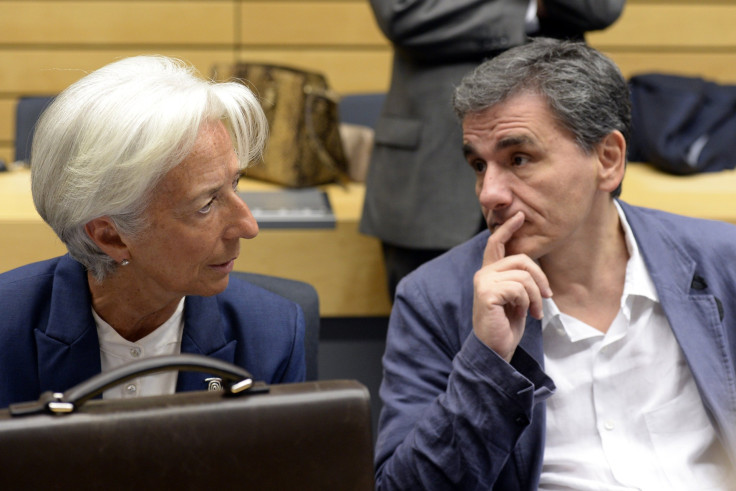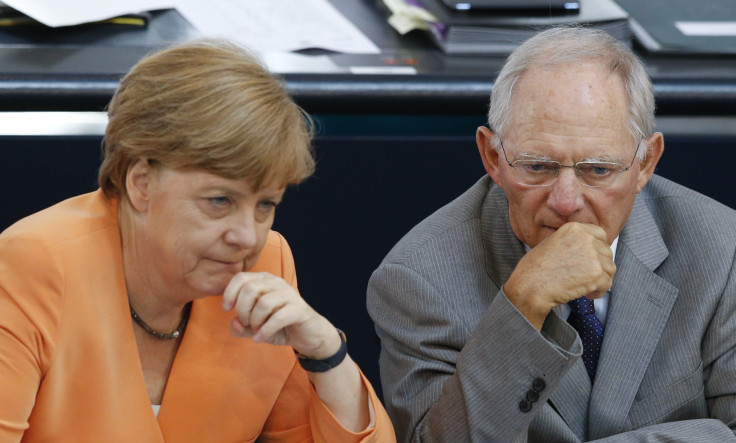Greek Debt Crisis: Eurogroup Finance Ministers Demand Greece Implement Austerity Measures Before Bailout Talks Can Begin

Eurozone finance ministers apparently decided they will take a wait-and-see approach in considering a third bailout for Greece. In a blow to the Greek ruling coalition, Eurogroup finance ministers representing the 19 countries in the monetary union at a meeting in Brussels this weekend indicated the bailout proposal submitted Thursday would not be discussed until the nation makes changes in its pension system and value-added tax (VAT) rates, while strengthening the independence of its statistics office, according to a draft statement cited by Reuters.
Without a bailout, Greece is almost certain to default on a scheduled debt repayment to the European Central Bank (ECB) July 20.
The finance ministers’ move comes after weeks of insults, brinkmanship and last-ditch offers on the parts of Athens and its creditors -- the International Monetary Fund, European Commission and ECB. Multiple eurozone leaders have said that failure to reach a deal would precipitate a Greek exit -- Grexit -- from the eurozone.
European Union officials from 28 countries had been set to convene Sunday to cobble together a response to the impasse, which has only intensified since Greece’s left-wing Syriza party took power in January. However, European Council President Donald Tusk announced on Twitter early Sunday that the EU summit had been canceled:
I have cancelled #EUCO today. #EuroSummit to start at 16h and last until we conclude talks on #Greece
— Donald Tusk (@eucopresident) July 12, 2015At some point, it is expected that European leaders will discuss extending humanitarian aid to Greece, whose banks have been closed since June 28. The economy has ground to a crawl in recent weeks as medicine shortages and fears of food insecurity spread.
After a stinging rejection of a previous Greek proposal by the eurozone finance ministers in June, the country’s government called a popular referendum over its creditors’ program of austerity and reform. Although more than 60 percent of Greeks sided with the ruling Syriza party’s leaders in rejecting the deal, the government ended up submitting a proposal last week broadly in line with what the finance ministers wanted, with measures including pension cuts and tax hikes.
Yet the rejection of that proposal raises a host of new questions about what’s next for Greece and the eurozone. Both Syriza and the ECB have already drafted plans for an orderly Grexit. But many economists doubt such a feat is possible without further damage to the well-being of the Greek people and stability of the EU.
Two previous bailouts in 2010 and 2012 provided 240 billion euros ($267.76 billion) in loans to Greece.

In the draft statement seen by Reuters, the Eurogroup finance ministers spelled out what they desired to see in terms of 10 “commitments of the Greek authorities on the basis of a clear timetable.” The finance ministers said they wanted Greece to take the following steps:
- “Fully comply with the medium-term primary surplus target of 3.5 percent of GDP by 2018, according to a yearly schedule to be agreed with the institutions;
- “Carry out ambitious pension reforms and specific policies to fully compensate for the fiscal impact of the Constitutional Court ruling on the 2012 pension reform and to implement the zero deficit clause;
- “Adopt more ambitious product market reforms with a clear timetable for implementation of all OECD toolkit I recommendations, including Sunday trade, sales periods, over-the-counter pharmaceutical products, pharmacy ownership, milk, bakeries. On the follow-up of the OECD toolkit II, manufacturing needs to be included in the prior action;
- “On energy markets, the privatization of the electricity transmission network operator (ADMIE) must proceed, unless replacement measures can be found that have equivalent effect, as agreed by the institutions;
- “On labor markets, undertake rigorous reviews of collective bargaining, industrial action and collective dismissals in line with the timetable and the approach suggested by the institutions. Any changes should be based on international and European best practices, and should not involve a return to past policy settings which are not compatible with the goals of promoting sustainable and inclusive growth;
- “Fully implement the relevant provisions of the Treaty on Stability, Coordination and Governance in the Economic and Monetary Union, in particular to make the Fiscal Council fully operational;
- “Adopt the necessary steps to strengthen the financial sector, including decisive action on non-performing loans, transposition of BRRD and measures to strengthen governance of the HFSF and the banks;
- “Develop a significantly scaled up privatization program with improved governance. A working group with the institutions shall provide proposals for better implementation mechanisms;
- “Amend or compensate for legislation adopted during 2015 which have not been agreed with the institutions and run counter to the program commitments;
- “Implement the key remaining elements from the December 2014 state of play of the fifth review of the second economic adjustment program.”
© Copyright IBTimes 2025. All rights reserved.






















